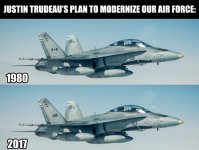- Reaction score
- 146
- Points
- 710
Note ref. at end to pilots leaving RCAF:
Mark
Ottawa
Liberal Plan For Interim Jets Tackles 'Capability Gap' That Doesn't Exist: Experts
Feds accused of buying "bucket of bolts" from Australia.
The federal government is expected to announce Tuesday that it will delay the launch of an open competition to replace Canada's aging CF-18 fighter jets and purchase second-hand 30-year-old Australian aircraft instead in an effort to fix a capability gap that industry observers describe as "fictional."
"It is absolutely, totally, nonsensical," Alan Williams, the former assistant deputy minister (materiel) for national defence, told HuffPost Canada of the Liberal government's impending announcement.
"There is no need to have interim jets. There is no need to waste billions of dollars, no need to train people on different platforms," he said. "Even if you admit there is a gap — which I don't think anyone seriously believes — the way to go about resolving it is exactly the opposite of what they are doing."
'You are not reinventing the wheel'
The fastest way to fix the problem is through a competition, he said.
"Everything is out there. You are not reinventing the wheel. There is no reason why they can't start that within a month, if they want to."
...25 months after forming government, Prime Minister Justin Trudeau's ministers are suggesting an open competition won't occur until 2019.
"They could have announced they would run a competition two years ago," Williams said, "and be well done with it."..
While the Grits have promised to buy 88 brand fighter aircraft, Sajjan told reporters more planes are needed to address an "interim capability gap."
That gap is the number of jets required to fulfil Canada's NATO and NORAD commitments simultaneously. The National Defence Department won't say what missions might be compromised if new jets aren't purchased and for decades successive governments have managed the risk believing it was unlikely all those aircraft would be needed at the same time.
"For reasons of operational security, the RCAF cannot comment further on how it manages the employment of its CF-18 fleet," Daniel Le Bouthillier, the head of media relations at DND, told HuffPost Canada.
The high-end of Canada's NATO obligation is a promise to have six jets ready to fly in short order, said David Perry, a senior analyst with the Canadian Global Affairs Institute. The NORAD commitment is classified. "It would be the worst case scenario — literally, the Russians are coming," Perry said...
[But serving Air Force major said this in 2006:
...In NORAD, the Canadian Forces are committed to provide 36 fighters for air sovereignty and homeland security. In addition to this Canada is committed to provide six or more fighters to the United Nations and/or NATO at any given time, should the need arise...
https://milnet.ca/forums/threads/120786/post-1466311.html#msg1466311
But now the numbers have been deleted at end p. 36 and start p. 37 in the only version of the piece I can now find on the web!!!
Latest edit: see footnote 5 (for NORAD figure of 36--"Various unclassified briefings conducted
at 1 Canadian Air Division Headquarters – Winnipeg, Manitoba"; would be no footnote unless it was for numbers as no need to document the overall, as opposed to specific, NORAD commitment
http://www.journal.forces.gc.ca/vo7/no2/doc/roberds-eng.pdf ]
Al Stephenson, a retired colonel with 35 years experience flying fighter aircraft, also believes there is no gap.
"This capability gap is a figment of their imagination," he said.
"The funny thing is they have dismissed the experts saying there is a capability gap and now they are creating one in order to delay the competition," Stephenson told HuffPost.
He is concerned that the government's timeline for an open competition will be five years, and extend past two elections — "which is nonsense."..
A competition might also entice pilots to stay in the air force longer, he said. A steady number leave each year to join the airline industry or take lucrative jobs as private pilots in the Middle East [emphasis added], he said...
http://www.huffingtonpost.ca/2017/12/12/liberal-plan-for-interim-jets-tackles-capability-gap-that-doesnt-exist-experts_a_23304661/
Mark
Ottawa



